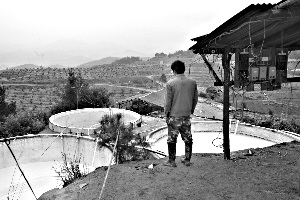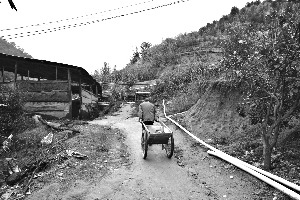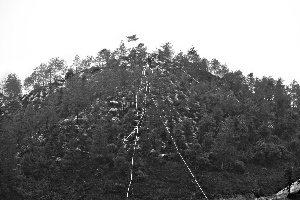Illegal REE Mining In ChinaThe plight of China's rare earth mining
Updated: 2011-03-24 19:04
By Zhang Jiawei (chinadaily.com.cn)
"Iam so dead," Huang Renzhu said in great disappointment after makingdozens of calls but still not managing to buy a single gram of rareearth for his company in this city, where a shovel into the ground maybring plenty of riches.
It was in late February when Huang, whoheads a company that produces permanent magnet material in Ganzhoucity, East China's Jiangxi province, felt an obvious crunch in rareearth supplies, Beijing News said.
|  A man stands at an illegal rare earth mining site at a mountaintop in Beitou township in Ganzhou, East China's Jiangxi province, Feb 18, 2011. [Photo/Beijing News] A man stands at an illegal rare earth mining site at a mountaintop in Beitou township in Ganzhou, East China's Jiangxi province, Feb 18, 2011. [Photo/Beijing News] |
He believed people were hoarding thematerial for better prices after the Ministry of Land and Resourceslisted Ganzhou in the nation's rare earths planning areas on Jan 19,which led the city's illegal miners to decide to restrain for a while.
Huang is right in part. People andtheir poor equipment are seldom seen near the main roads, where illegalmining was once quite rampant, after the new regulation took effect.
Butwhat Huang may have failed to notice is the busy scene hidden deeply inthe mountains and the fact that even the mountains themselves aretradable.
Deep in what locals call GengbeiMountain in Beitou township, Quannan county in Ganzhou, dozens of peoplewere busy at work on Feb 18 at a mining spot, which was ordered closedby the local government in 2009 due to its contamination of a river andthe consequent protests by locals.
They were pumping liquid into one ofthe three pools with a thick plastic pipe. In one of the pools, milkysediment seemed to be the early progress they made in producing rareearths.
Villagers claim the workers were miningillegally. Zhong Guanming, the foreman, said he was just working forhis boss, Lei Guosheng, and he didn't know whether it was illegal ornot.
But according to Lei, he is only anearby orchard contractor who sometimes goes to the mining spot tocollect some remains that may contain rare earth. Lei said Zhong, whohas been mining here since 2004, is responsible for all the mining.
Zeng Shumin, deputy director of theQuannan mine management bureau, said Lei was indeed collecting theremains of the illegal mine closed in 2009. But he refused to explainwhy the producing facilities were still running at the illegal miningspot.
|  A man drags a two-wheel cart on a mountain path in Beitou township in Ganzhou, East China's Jiangxi province, Feb 17, 2011. [Photo/Beijing News] A man drags a two-wheel cart on a mountain path in Beitou township in Ganzhou, East China's Jiangxi province, Feb 17, 2011. [Photo/Beijing News] |  White pipes are seen on a mountain in Beitou township in Ganzhou, East China's Jiangxi province, Feb 17, 2011. [Photo/Beijing News] White pipes are seen on a mountain in Beitou township in Ganzhou, East China's Jiangxi province, Feb 17, 2011. [Photo/Beijing News] |
Despite the illegal practices beingfrequently reported to the government and the fact that the miners mayface hefty fines or end up in jail, the generous profits that can beexpected have geared them up with the courage to take the risks.
A source from a rare earths processingfirm in Ganzhou said a ton of rare earth mixed metal, a typicalcomposition that includes approximately 50 percent cerium and 25 percentlanthanum, is priced at 150,000 yuan ($23,000), but costs only 30,000yuan to produce.
China's quota policy allowed Ganzhou toproduce 8,500 tons of rare earths in 2010, but industry insiders saidthe city produced at least 300,000 tons, more than triple its quota,Beijing News said.
Yang Xinhua, deputy director ofGanzhou's nonferrous metallurgy institute, said the country's aim ofmaking Ganzhou a rare earth planning area was to enforce controls overits rare earth resources. And the city needs to solve the problem ofillegal and excessive mining.
"If illegal mining cannot be stopped,rare earth planning would be a disaster for us," said a source from adown-stream rare earth processing firm.
He is concerned that legal mining woulddecline under the planning, which would cause a price surge in raw rareearth materials, encouraging more illegal mining. And illegal minerswould hoard their products for higher prices, making survival of hisfirm even harder.
Failed monopoly
China has issued a total of 103 rareearth mining licenses, and Ganzhou alone owns 88. The city handed overall its licenses to the newly founded Ganzhou Rare Earth MineralIndustry Co Ltd in 2004, hoping for total control of the resources bymonopolizing them.
The company was co-founded by citygovernment and the governments of eight of its rare earth-rich counties,according to Ma Zhaoshan, deputy director of the city's mineralresources bureau.
It has eight branches, which would handover their quotas to private mine contractors, whose products wouldthen be bought by the company and then sold to down-stream firms in thecity for further processing.
But the situation doesn't seem to have improved.
"Ganzhou Rare Earth Mineral hasseemingly been controlling all the city's rare earth resources, but it'sactually not a monopolizing company at all," said an expert on rareearth elements.
The expert said the company's intentionis worth praising, but the mine bosses were the same people who hadbeen operating since the company itself was not capable of exploring theresources. The bosses won't be satisfied by the company's profits andwould try every means to take up illegal and excessive mining.
To make matters worse, the city'smining regulators can't effectively regulate the mine bosses who areunder the umbrella of the company, which is more like a governmentagency.
A new business
Yang Xinhua said the company should getits hands dirty and explore the mines on its own, but "that is toohard," according to Guo Xiaobin, general manager of a rare earth companyin Ganzhou.
"The mines on the mountains have allbeen controlled by private miners," Guo said, adding that those whodon't want to take the risk of mining illegally would sell the mines toothers, which is called "mountain speculation" by local people.
He Rencheng, a villager from Huangtangvillage in Beitou township, said the village's more than 500 mu (33hectares) of mountains were sold at 450 yuan per mu by village officialsto a contractor for 10 years of use.
More than 20,000 mu of mountains inXingguang village, also in Beitou township, were sold to contractors for500 to 1,000 yuan per mu. The buyers can explore the mountain for fiveto 10 years, with the longest being 40 years.
Transfer of the rare earth-rich mountains would bring huge amount of profits.
A contractor who bought severalmountains for millions of yuan in Ganzhou said locals who have the moneyall rush to buy mountains and then sell them for 6,000 yuan per mu tothose who are willing to take the risk of mining illegally.
Guo Xiaobin said some mountain speculators don't even bother measuring the area of the mountains -- they just sit and bid.
If Ganzhou Rare Earth wants to operatethe mines, then it will have to pay huge prices to buy the rights fromthe speculators, Guo said.
"So, it will be a tough job," Guo said.